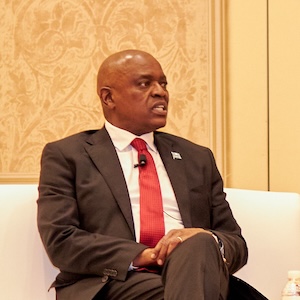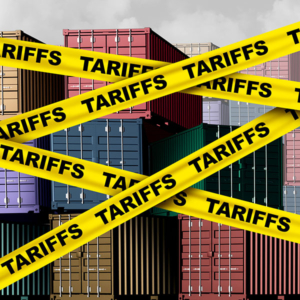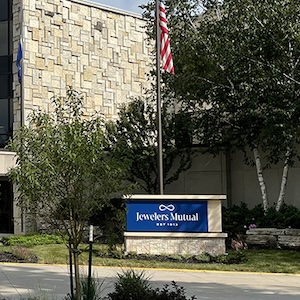
At the JCK show in Las Vegas, Botswana’s president, Mokgweetsi Masisi, sat for an interview with JCK news director Rob Bates last Saturday, following a fireside chat with JCK editor-in-chief Victoria Gomelsky the night before. The Q&A below includes excerpts from both conversations.
Botswana’s government brought a 50-person team, headed by you, to JCK. What was its objective?
At a time of challenge…we wanted to assure people that Botswana will responsibly manage its diamond business, even with the demerger and remodeling of the new De Beers.
Let’s talk about the De Beers sale. Botswana owns 15% of the company. Who would be your ideal owner for De Beers?
We are very clear about that, in the same way we are clear about who should not [own it]. We are going to keep the bad guys out. We want entities to come in who are aligned with our vision of how to do business. We will inevitably partner with them, and we will invariably regulate them. They would need to tolerate us as a partner, in the same way as we tolerate them. So it’s all incentivized, and we’re aligned, and we move forward.
Who would be a “bad” owner?
One of the characteristics of a bad owner is someone who has impatient capital. This industry requires somebody who is in it for the long haul, because it has its ups and downs.
Were you disappointed in Anglo’s decision to sell De Beers?
We are very happy about it. It’s the best thing.
Why?
Anglo is under threat of being taken over by others. [Diamonds] are not in [those companies’] forte. Diamonds are our forte.
Could Botswana up its share in De Beers from the current 15%?
Sure, if it’s attractive to.
Do you think other producer nations, like Namibia, might also take a stake?
They could. Depends on the negotiations. They have skin in the game too.
You still haven’t signed a final contract with De Beers. When do you expect that?
We had planned to sign by the end of June. But there are small sticking points that I think we’ll overcome in the coming weeks. That might push it to July.… The deal is coming. It’s just dotting the i‘s and crossing the t‘s.
Can you take us inside the negotiations? Were they tense at times?
Of course there were tensions. How could there not be? When you tell your partner—the only partner that you’ve known, who has opened you up to the world, and found the biggest discovery you’ve ever had—that they grew at such a rate, and you didn’t grow at a commensurate rate and you are not happy, it is not easy. But we had to do it. I represent my people. We were not going to tolerate anything less than what we got.
That is why I was willing to walk out. If we did that, our economy would go through a massive recession, and I would probably lose the election. But I would have saved my country, and I was confident that De Beers would not survive.
At the 10th year of the proposed new contract, De Beers would sell 50% of Debswana’s production, and state-owned Okavango Diamond Company (ODC) would sell the other 50%. [ODC currently sells 25%, which would rise to 30% when the new contract is signed.] Could there be price competition among the partners?
We are not out to compete. We are out to grow the pie. When you are out to grow the pie, there shouldn’t be competition. There should be synergy.
ODC will not just sell through auctions, as it does currently, correct?
Yes. We wish to diversify.
What other changes will happen as a result of the new contract?
We get to be known. And we get to know the market. Buyers will come to us. Cutting factories will increase. [Botswana currently has 48 diamond factories, employing 4,800 people.] We will build our skill base, our investment.
ODC has joined the Natural Diamond Council. Do you expect to keep supporting industry marketing?
Yes, we will do what it takes to grow value. If we take greater responsibility, we will play a greater role in the marketing, the thinking behind it, the conceptualization of it. It’s a learning curve for us.
Do you plan a Botswana brand?
Botswana has everything it takes to meet the criterial needs of developing its own brand. We are a value proposition as a country, in the way we govern it. We are a value proposition as a country in the way we utilize the revenue from diamonds. Therefore, diamonds from Botswana should be identified uniquely for what they do and what they are.
When you wear a diamond from Botswana, you should feel different about it, and that is what we want to pack into a brand.
What did you think of De Beers’ presentation at JCK? Are you aligned with De Beers’ new strategy, as well as some of its recent moves, like Lightbox?
We are happy with some of the strategic moves. As you know, we didn’t buy into Lightbox. We feel very strongly that when a company that is so invested in diamonds buys into [synthetics], then you give them legitimacy. There was a counterargument—and this is when the decision was taken by Anglo and De Beers—that you want to get in there, so you can discover what they do and help to moderate that. That worked in some ways.
Overall, do you think creating Lightbox turned out to be a good or bad decision?
Bad decision. I didn’t like it.
Has the industry been too slow to react to lab-grown diamonds?
You should never underestimate anyone that attempts to scratch you and do you harm.… But they may have been underestimated, to our detriment.
Have lab-grown diamond sales hurt your economy?
Sure. If you have less sales, it hurts your economy….
In Botswana, diamonds mean livelihood.… In Botswana, every diamond, every carat means a road. They mean drugs for our hospitals. Education. Telecommunications. Security. Energy. Clean air.
So would you say the lab-grown diamond boom has done harm to your citizenry?
Of course. It means reduced sales. It means reduced revenue. And like a wounded buffalo, you fight back.
Do you want a Botswana “rough node” in conjunction with G7 sanctions on Russian diamonds?
We insist on it…. The [original sanctions plan] was developed without consulting those who would be most affected.
Do you see the G7 sanctions as a possible opportunity? You will have the world’s largest diamond market, the U.S., largely to yourself.
Barriers to trade, in whatever form they take, can easily cause you to slumber, and be caught napping. We will always be agile. There may be a temporary convenience in that respect, but sanctions can come off in the same way that they came on.
Botswana’s deal to buy 24% of HB Antwerp also hasn’t been signed. Is that contingent on a new De Beers contract?
No, it isn’t. We are still doing due process and valuation. You know they had a little trouble internally. Happily, that is over with. That required enhanced due diligence. We are a very frugal government.
What do you want to say to JCK readers?
Our delegation will only be bigger and better next year. We are stepping up.
And do you want to see more industry people come to Botswana?
Of course. Our relationship is predicated on reciprocity. We invite you all to come to Botswana. See for yourself. Feel for yourself. And be part of this story…. We have been reliably informed by recent studies in paleontology that [all humans] come from Botswana. It’s about time you all get home.
Top: President Masisi at his fireside chat (photo courtesy of JCK Events)
- Subscribe to the JCK News Daily
- Subscribe to the JCK Special Report
- Follow JCK on Instagram: @jckmagazine
- Follow JCK on X: @jckmagazine
- Follow JCK on Facebook: @jckmagazine






